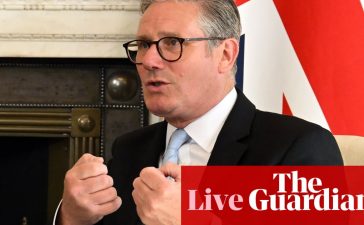Sterling rises by 0.5% to one-year high; stock markets slip
The pound has risen by 0.5% to $1.3032, its highest level since mid-July last year, after the higher-than-expected UK inflation figures, which analysts said diminished the chances of an August rate cut.
Against the euro, sterling touched a two-year high of €1.1927 and is now trading at €1.1905.
Sterling has risen by 2.4% against the dollar so far this year, and by 3.3% against the euro.
The FTSE 100 index has lost nearly 20 points to 8,146, a 0.2% fall, while other European markets have also slipped, dragged down by the Dutch semicondutor firm ASML following a weak forecast. Investors are also concerned about potentially stricter US trade rules.
Facing pushback to its chip crackdown on China, the US has told its allies that it is considering using the most severe trade restrictions available if companies such as Tokyo Electron and ASML continue to give China access to advanced semiconductor technology, Bloomberg News reported. It said:
Seeking leverage with allies, the US is mulling whether to impose a measure called the foreign direct product rule, or FDPR, said people familiar with recent discussions. The rule lets the country impose controls on foreign-made products that use even the tiniest amount of American technology.
Key events
Here is our full story on HSBC naming its new boss.
HSBC has appointed its finance chief, Georges Elhedery, as the bank’s new chief executive to replace Noel Quinn, who is stepping down after five years in the role. He was widely seen as the top favourite for the job.
Elhedery, who will take on the post in September, is being promoted from chief financial officer, which he took up in January last year.
He can speak passable Mandarin, making him the first CEO in HSBC’s modern history to have that key language skill, according to Bloomberg.
UK house prices rise by 2.2%
House price inflation in the UK picked up in May, while rents also continued to rise, according to official figures.
House prices rose for a third month in a row, increasing by an annual 2.2% after a 1.3% rise in April, according to the Office for National Statistics.
Private rents climbed by 8.6% in the year to June, down a tad from May’s annual rate of 8.7%.
Amazon workers in Coventry vote against union recognition
Workers at Amazon’s Coventry warehouse have voted against a historic trade union recognition deal, in a setback for campaigners who had been pushing for the right to collectively bargain over pay and conditions.
Workers voted by a majority to reject the proposal for the GMB trade union to represent them in negotiations with the US online retailer.
Union officials said Amazon had “created a culture of fear” and used intimidatory tactics to stifle support among the 3,000 strong workforce at the West Midlands hub after a battle for recognition lasting more than year.
Stuart Richards, a GMB senior organiser, said the union would consider a legal challenge.
From day one Amazon have been relentless in their attacks on their own workforce. We’ve seen workers pressured into attending six hours of anti-union seminars on top of the fortune spent by Amazon bosses to scare workers.
Here is our full story inflation again:
Administrators say rescue deal for Body Shop is close
A consortium led by British tycoon Mike Jatania is close to agreeing a rescue deal for the Body Shop, administrators of the high street beauty chain said.
A bidding team headed by by Jatania’s investment firm Aurea is in exclusive talks with joint administrators at FRP Advisory, with the former chief executive of beauty brand Molton Brown, Charles Denton, being lined up to lead the management team.
In a joint statement issued by Aurea and administrators of the Body Shop International, they said they hope that a deal can be struck in the “coming weeks”.
Aurea is now going through The Body Shop books, they added.
Following a competitive bidding process, the joint administrators of The Body Shop International have now entered into an exclusivity agreement with a consortium led by Auréa group, with the management team to be led by former Molton Brown CEO Charles Denton.
While the deal is not yet complete, we believe the combined experience of the consortium, together with the existing management team, represents the best outcome for creditors and will ultimately ensure the long-term success of The Body Shop.
A period of due diligence will now take place, with the intention to complete the transaction in the coming weeks.
The Body Shop collapsed into administration in early February, leading to hundreds of job losses and dozens of store closures.
Neil Wilson, chief market analyst at the brokerage Finalto, has looked at sterling:
The Fed could cut rates ahead of the Bank of England, which should offer some near-term support for sterling. My fear is that the BoE is being too cautious here. Nevertheless if we see this move in sterling sustained we should consider a new trading range for the pound between $1.30 and $1.40. We should not discount the effects of the politics on this for now, in the eyes of investors at least – a degree more clarity and consistency in terms of policymaking.
There is clearly a reset and people are looking at the UK with fresh eyes. The economy seems to be moving in the right direction and we are handling higher rates a lot better than expected despite the relatively strong transmission of monetary policy vs the US. That strong transmission should work in our favour when the BoE does start to cut…maybe the Bank is mindful that there is a lot of pent up energy in the old bulldog yet and it’s going be careful about unleashing it.
Steve Clayton, head of equity funds at Hargreaves Lansdown, has looked at this morning’s main developments in the UK:
Inflation figures released this morning show the Consumer Prices Index holding at 2% for the second month in succession. The headline figure will be welcomed in Downing Street, but the Bank of England is likely to be concerned that the pace of inflation in dervices remains stubbornly high at 5.7%, also unchanged on the month.
Services inflation had been predicted to fall this month and its failure to do so could well leave the Bank’s rate-setting Monetary Policy Committee wary of making any early reductions in UK rates…. suggesting good news for savers, but more pain for mortgage holders who may have to wait longer to see their monthly payments start to ease.
Turning to the king’s speech at 11.30am BST, he said:
King Charles will deliver the second King’s Speech of his reign later today, on behalf of the new Labour Government. Around 35 laws are set to be outlined as PM Starmer’s government unveils its plan to ‘take the brakes off Britain’. Key measures expected in the speech include a new planning bill, which will make it harder for councils to block development and powers forcing them to identify development land in their areas.
More devolution in England will see mayoral powers increased, whilst GB Energy will be set up to drive de-carbonisation of the power grid with an £8.3bn budget to kick-start projects. Not everything will be new; bills tabled previously by the Conservatives but not yet enacted, like the phased ban on smoking are set to be put back onto the government’s agenda too.
Babcock, the aerospace, defence and engineering company, said that it has seen a further deterioration in its performance under a contract to build five Type 31 frigates for the Royal Navy. The company is setting aside a further £90m provision, taken against upcoming full year results. The provision relates to expected future wage costs. The contract had allowed for wages rising in line with the consumer price index, but Babcock is finding that labour simply can’t be found in sufficient quantities at the wage rates built into the contract.
The company also reports that Type 31 aside, underlying profits are sharply higher, and the improving state of its pension fund will allow future top-up contributions by the company to be £25m a year lower.
HSBC has announced that Georges Elhedery, a long-time HSBC staffer, most recently serving as its chief financial officer, has been appointed to the top slot, replacing outgoing CEO Noel Quinn whose departure was announced a few weeks ago. Elhedery, a graduate of the Paris’s Ecole Polytechnique and the ENSAE, takes up his new role in September.
Reckitt Benckiser said its Mead Johnson infant formula business has suffered a tornado strike to its warehouse in Mount Vernon, Indiana. No staff were injured by the tornado strike, although the surrounding community did see severe damage. Reckitt said the warehouse is out of action and business will be hit in the near term while it reorganises its operations.
Sterling rises through $1.30 after higher-than-expected inflation data
Sterling has just risen through the $1.30 mark after the higher-than-expected inflation figures.
It’s up by 0.32% at $1.3007, the highest level in a year.
Sterling also hit a near-two-year high against the euro of €1.1921.
King’s speech to set out mandatory housing targets
It’s also king’s speech day.
At about 11.30am, shortly after leading the royal procession into the House of Lords and hopping on to his throne, King Charles will set out the new government’s agenda, writes my colleague Archie Bland.
With Labour’s manifesto plan for mandatory housing targets at the heart of it, it’s probably going to be short on surprises. But it will start to flesh out the detail of how Keir Starmer intends to govern – and whether his party’s swollen backbench numbers might bring headaches as well as parliamentary security.
Peter Arnold, UK chief economist at the EY Item Club, said:
Inflation is unlikely to fall much further now. The contribution from the food and services categories should decline gradually as firms pass on the gains from their lower energy bills. However, the drag from falling energy prices will start to fade from July, and this is likely to mean that headline inflation temporarily drifts up towards the end of this year. But the bigger picture is one where the inflation pressure of the past three years has dissipated, and the EY Item Club expects a period of relatively low and stable inflation to underpin steady improvements in household spending power.
The minutes of last month’s Monetary Policy Committee (MPC) meeting made it clear that the committee is split, he said.
The more hawkish members may see today’s data as evidence that their concerns about inflation persistence are well founded. The implications for the more dovish members are unclear. On the one hand, they indicated they were becoming less interested in backward-looking measures of inflation persistence and were adopting a more forward-looking approach. And that shift had occurred despite a string of overshoots for services inflation.
But on the other hand, from a presentational point of view, they might feel that they need to wait for inflation to surprise on the downside before they move. A hawkish response from markets to today’s data might also encourage the MPC to wait.
The BBC’s economics editor Faisal Islam said:
NEW
Inflation sticks exactly on target at 2% in June…
Food price inflation now 1.5%
Services inflation stick at 5.7%… core sticks at 3.5%
Goods disinflation -1.4%, largest fall since 2016
— Faisal Islam (@faisalislam) July 17, 2024
Joel Hills, business and economics editor at ITV, said:
The prospect of an interest rate cut next month just got weaker.
The UK headline annual rate of inflation remained at the 2% target in June but “Services” inflation (in red below) remained lodged at 5.7%. The @bankofengland forecast 5.1% – that’s quite a miss… pic.twitter.com/o8aseS2wNE
— Joel Hills (@ITVJoel) July 17, 2024
Investors pare expectations of August rate cut, pound rises 0.2%
Financial markets now see a 35% chance of an August rate cut, down from nearly 50% earlier this morning, and the pound has risen by 0.2% against the dollar to $1.2994.
Sanjay Raja, chief UK economist at Deutsche Bank, said:
For the majority of the MPC [ monetary policy committee], today’s inflation report won’t be as encouraging as it may have anticipated. Undoubtedly, today’s services print raises the bar for an August rate cut. But there is a key caveat here. With live music and accommodation prices rising at such speed, the MPC could potentially be minded to look past some of the upside in services inflation.
To be sure, we now think that an August rate cut is finely balanced. A lot will now depend on the strength of the May wage and unemployment data.






